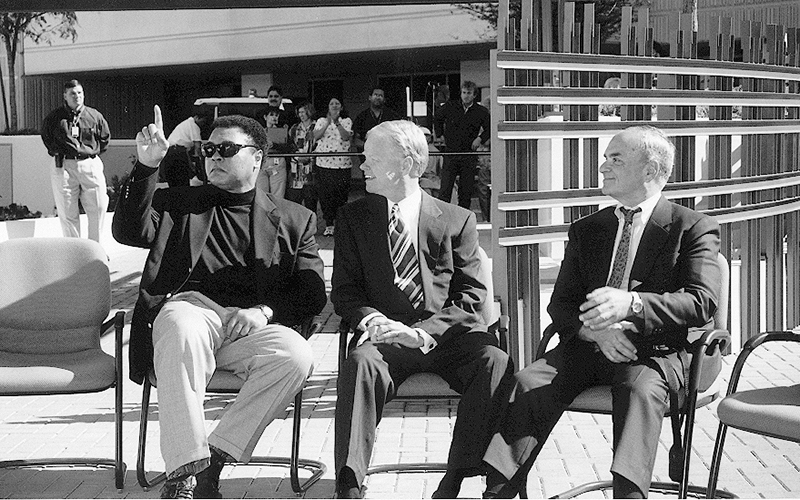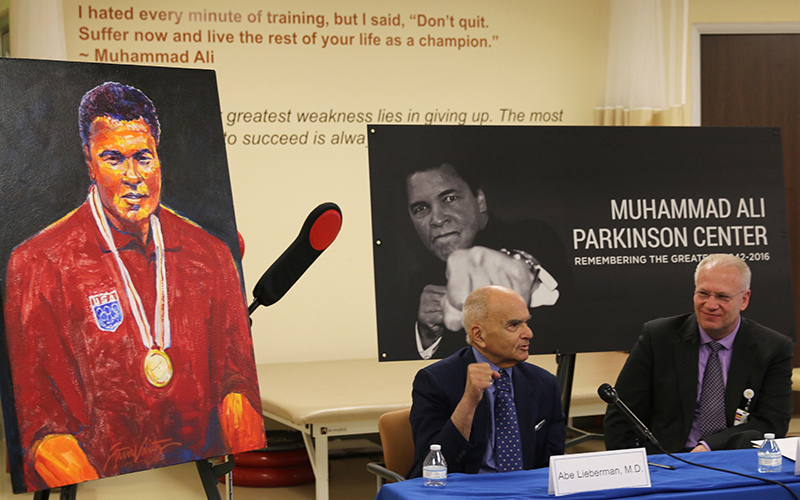PHOENIX — Karen O’Donnell may have only met Muhammad Ali twice, but Ali’s efforts in the fight against Parkinson’s disease have been invaluable to her and her husband, John, who has suffered from the disease for 23 years.
The O’Donnells are just one of the many families who have benefited from the work of the Muhammad Ali Parkinson Center at the Barrow Neurological Institute since its founding in 1997.
“At different times, people with Parkinson’s and their caregivers have different needs,” Karen said. “The Ali Center has done a beautiful job of reaching out to all of those needs that occur at different times. You don’t feel so isolated, you don’t feel so overwhelmed, and you don’t feel so alone.”
Ali and his wife, Lonnie, co-founded the center along with one of Ali’s physicians, Dr. Abraham Lieberman, who became its first director, and Jimmy Walker, the Arizona businessman who has run the Celebrity Fight Night event that has raised more than $20 million for the center. It moved to its current location at the Barrow Neurological Institute in 2009, serving as a leading resource for those with movement disorders.

Muhammad Ali (left) and Lonnie Ali (not pictured), Jimmy Walker (center) and Dr. Abraham Lieberman co-founded the Muhammad Ali Parkinson Center at Barrow Neurological Institute in 1997. (Photo courtesy Barrow Neurological Institute)
Ruby Rendon’s mother was diagnosed with Parkinson’s disease 10 years ago in Mexico. Rendon now volunteers three days a week at the center that bears Ali’s name.
“Just knowing you were in the same room as he was, kind of makes you feel that connection,” said Rendon, whose mother also is a patient at the center. “Looking at his pictures and all the stuff that we have at the center gives you that connection even though we didn’t meet him when he was alive.”
Ali not only gave his name to the center, he also received treatment there for the disease he fought for more than 30 years. Dr. Holly Shill, director of the Muhammad Ali Parkinson Center, said Ali wanted everyone to have the opportunity for that same treatment, no matter what their background.
“The mission of the center was always to provide the care for people whether they could afford it or not,” Shill said. “To help people deal with Parkinson’s disease on a regular basis, sort of what do you do in between your doctor’s visits while we’re waiting for the cure to happen.”
While the search for a Parkinson’s cure continues, the center works to improve patients’ quality of life through resources such as physical therapy, support groups and dance classes.
“As long as my mom can have a good quality of life, I’m OK with that, and I’m pretty sure she’s OK with that,” Rendon said. “If you keep waiting for that cure, it might not come. It’s a matter of having a good day every day.”
O’Donnell said Ali’s positive outlook helped give her and her husband strength in their own fight against the disease.
“He never complained,” she said. “No matter how difficult things were for him on a day-to-day basis, he just went on, and his courage gave us all inspiration.”
Lieberman, a close friend of Ali’s in addition to being his doctor, said the fighter’s legacy will live for years to come.
“I tell people, 100 years from now, no one is going to remember any of us, they’re going to remember Muhammad Ali,” he said.
(Video by Jiahui Jia)
